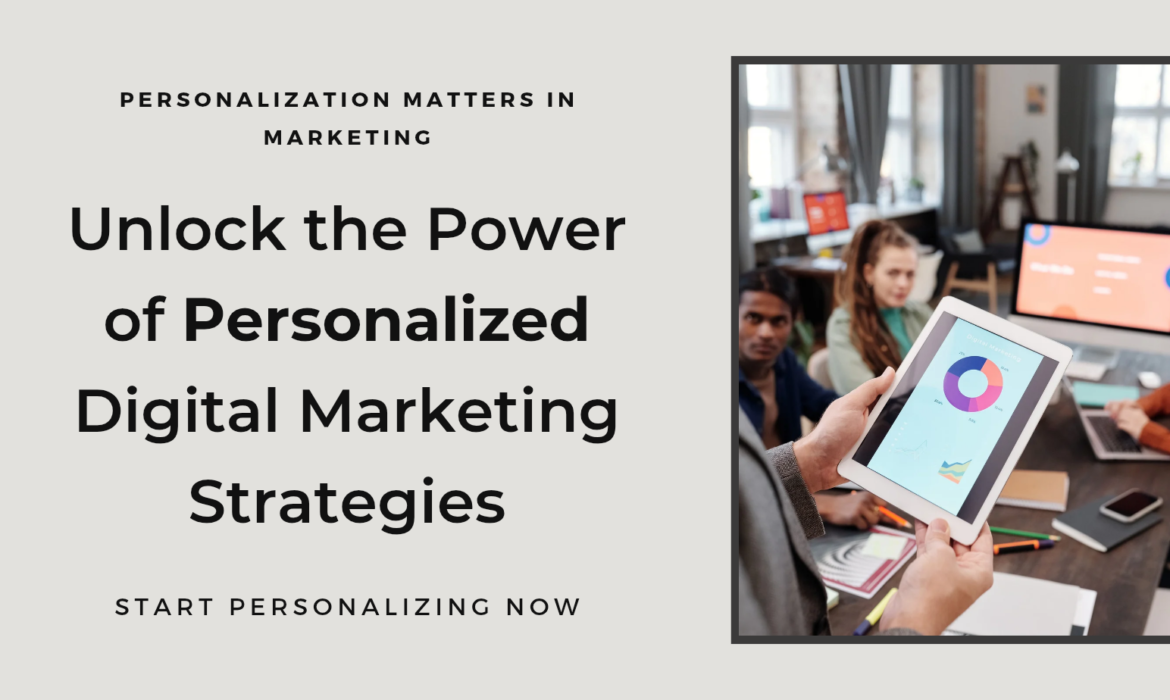081-4797-7173
Personalization is not about first/last name, it’s about relevant content -Dan Jak
In recent times, digital consumers are now being barraged every day with content, making it hard for a product, service, or brand to stand out. One of the efficient ways to make your brand stand out among the rest is personalization. Personalization in digital marketing gives the idea that businesses can create personalized experiences for their users to enhance engagement rates and conversion rates.
In this article, we’ll explore personalization in digital marketing, the importance of personalization in digital marketing, and examples of brands where personalization has been successful.
What is Personalization in Digital Marketing?
Personalization in digital marketing involves the creation of content, offers, products/services, and communication lines specifically made to the unique tastes, desires, and needs of individual clients.
Instead of taking the approach of using one medium for all customers, businesses make use of data like browsing history, purchasing habits, and demographic info to create customized experiences for the target audience. This degree of personalization allows businesses to speak directly to prospects, touching on specific worries and needs, thereby creating a deeper connection.
Personalization in marketing is not limited to expression, it can be used across different digital channels such as websites, social media, email, and paid advertising.
Personalization in the digital marketing space has contributed much to consumer decision-making,companies like Amazon and Netflix have become experts in personalizing digital experiences.
Personalization encourages client retention, and offering a personalized shopping experience encourages customer frequent visits and customer loyalty. This is why personalization in digital marketing is important for businesses looking to succeed in an increasingly competitive market.
The Importance of Personalization In Digital Marketing
Personalization is a very important aspect of successful digital marketing by tailoring content, offers, and experiences to the desires and needs of each prospect, you can build brand loyalty, increase engagement rates, and drive conversion rates
Here are four solid reasons why personalization is important in digital marketing;
Personalization boosts engagement rates of your prospects
Personalized email marketing messages help to increase prospect engagements and connection with your brand, resonate with their unique desire and needs, and also seem to be more relevant than general messages.
Personalization builds lasting trust
Once prospects understand that your brand is all about satisfying needs and desires that are unique to them, then they will pledge loyalty and trust your brand even more.
Personalization drives conversion rates
Now that your prospects trust your brand, they will automatically become paying consumers, and they will keep patronizing your product, services, and offers.
Personalization increases brand visibility
Once your services and products meet the needs and desires of each prospect, prospects will likely recommend your brand, product, or service to other customers, thereby increasing your reach.
We’ll give you more insight into brands that have successfully implemented personalization and how it has helped those brands to keep prospects engaged.
How to Implement Personalization in Digital Marketing
1. Prospect Information:
Personalization begins with analyzing and collecting prospect information. This includes browsing history, location, demographics, and purchasing habits. Marketers and brands should invest in tools that can compute and interpret these data to better understand their prospect’s needs and desires.
2. Division:
Segment your prospects into different parts based on particular criteria such as age, gender, location, or purchasing behaviors. Once divided, you can create personalized experiences directly for each team.
3. Ever-Changing Content:
Implementing content that can evolve based on who is making use of the website or emails that evolve based on the unique personality of the prospect, for example allowing for certain kinds of offers for subscribers and non-subscribers can create a more personalized experience.
4. Monitor and Improve:
Personalization is an ever-evolving process. Keep track of how your personalized content functions and make necessary changes to improve user experiences.
Examples of brands where personalization has been successful
Amazon
Every time you enter Amazon, its landing pages are automatically personalized; Amazon also personalized its product recommendations based on what you’ve viewed before. Amazon uses client data like purchasing habits, client wishes, lists, and ratings to give each client a unique experience.
Facebook is another company that uses personalization to keep clients engaged, examples of Facebook personalization include suggested friends list, watch or view history, suggested responses, and stickers used in Facebook messenger.
Netflix
Netflix is an online streaming service that is known for its personalized web experiences; it uses viewers’s history to generate recommendations, the landing pages are different for each user, and it also recommends TV shows and movies based on your location or similar to the ones you’ve viewed before.
Conclusion
Personalized experiences in digital marketing are gradually becoming a norm in the online space and most clients now expect brands and companies to tailor experiences according to consumer desires. Understanding and implementing this would help you reach your target audience, generate leads, and even increase your visibility and client engagement thereby earning you consumer loyalty.
0
Related Posts
January 12, 2025 Finance
How to Use Pinterest for E-commerce Growth
Pinterest is a powerhouse platform for ecommerce businesses looking to boost visibility, drive traffic, and increase sales. Unlike other social media platforms, Pinterest acts as a visual search engine...





